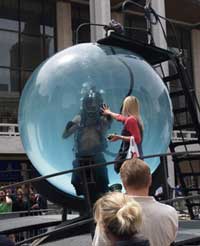Metropolitan Opera
Monday 8th May 2006
| Role | Artist |
|---|---|
| Tosca | Deborah Voigt |
| Scarpia | James Morris |
| Cavaradossi | Franco Farina |
| Sacristan | Paul Plishka |
| Conductor | Carlo Rizzi |
| Production and sets | Franco Zeffirelli |
Dear Colleagues,
This opera was up-staged to some extent by Mr Blaine in his huge water bubble in front of the opera house. The entire quadrangle was filled with people and a out-door screen set up for the spectacle of seeing a fellow citizen almost drown. Intermission saw hundreds more craning from every vantage to take a glimpse of the magnified image of Mr Blaine. Apparently he broke the submersion record but not the breath-holding one (which may be held by Monserrat Caballe).
This Met run has been subject of much discussion. Marcello Giordani had pulled out some weeks ago and Cavaradossi was to be played by Franco Farina. The great draw-card was still Ms Voigt whose return to the stage last year, slim and post operative was also of great interest.
alt="Old poster of a long ago performance of Tosca" />
performance of Tosca
I have never heard so much male "wobble" on stage as in this first act. Three veterans were guilty of this rather major vocal sin. For Plishka and Morris there are compensations but for Farina there were none as he sang badly for the first two acts. He belted out his music in the most unfortunate manner such that I felt people around me cringing, as I was. Farina forced, bleated and crooned his way throughout the first act in a most unseemly and tasteless manner. He was quite loud and sang on pitch and that seems to be enough for some people. There was some respite in Act III when he produced some much awaited musical magic and 'dolcezza'. 'E lucevan le stelle' was creditable, despite a falsetto diminuendo, while the duet singing 'worked', including the unaccompanied 'triumph' declamation. Perhaps he was more relaxed by this time of the proceedings.
Voigt received a polite ovation even before she sang an aria. Her Act I performance was just fine and in Act II she surpassed herself in both the 'Vissi d'arte' and its drama. Voigt took the opportunity to stab Scarpia on two occasions and he took several bars longer than usual to die in Act II. Farina's 'Vittoria' section was on key and large but lacked any beauty. More 'cringe' music.
Morris sang strongly but his persistent beat is off-putting and ugly. His 'Te deum' scene was adequate. Some would have preferred his act three.
I am pleased that Carlo Rizzi did not try to put his own stamp on the music. His tempi were classical and sympathetic. His orchestra members know what they are doing - with prominent low woodwinds and brass as Puccini mandated.
Not a high point of opera going for me. But an opportunity for a new audience to see the magnificent Zeffirelli production. Just to be a bit picky about an otherwise splendid 'realistic' rendition, I still don't know why Baron Scarpia has a flimsy little single bed in his chamber (I don't recall it being used), nor is it clear why Angelotti is so well dressed after months in jail. The alter portrait would appear to lack the detail to recognise a face or even to tell if the woman is blond, as required in the libretto.
New York streets were in chaos after the opera due to the added spectacle, huge crowds, traffic, closed lanes on Broadway, ambulance and fire trucks to boot. I was pleased to be on foot.



